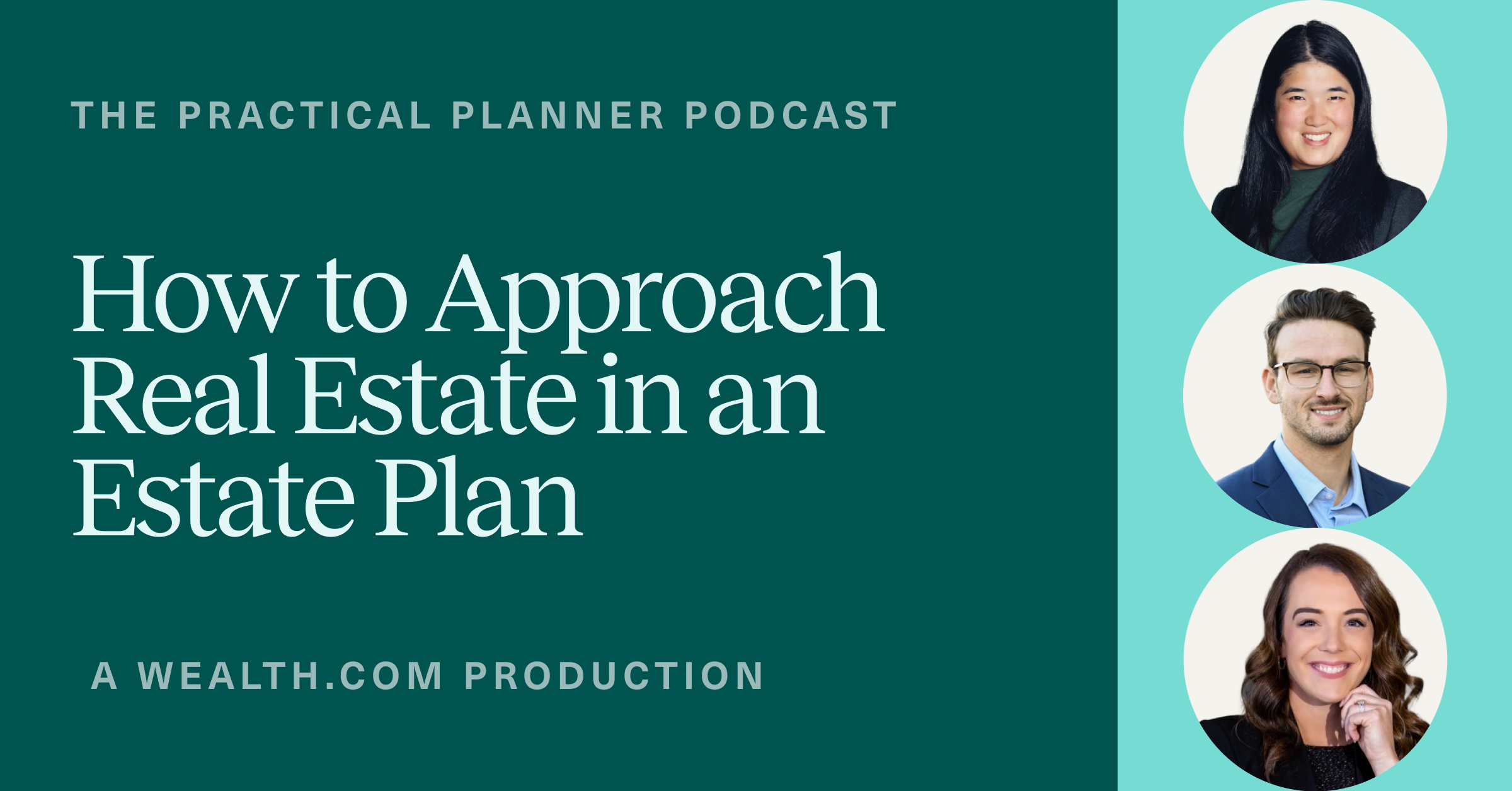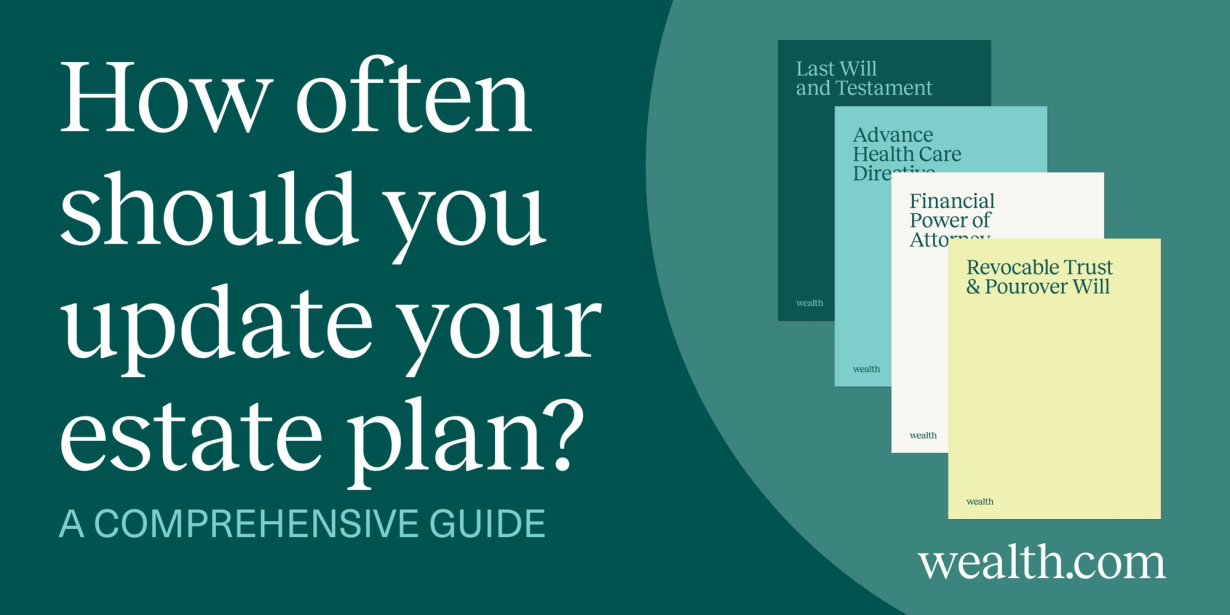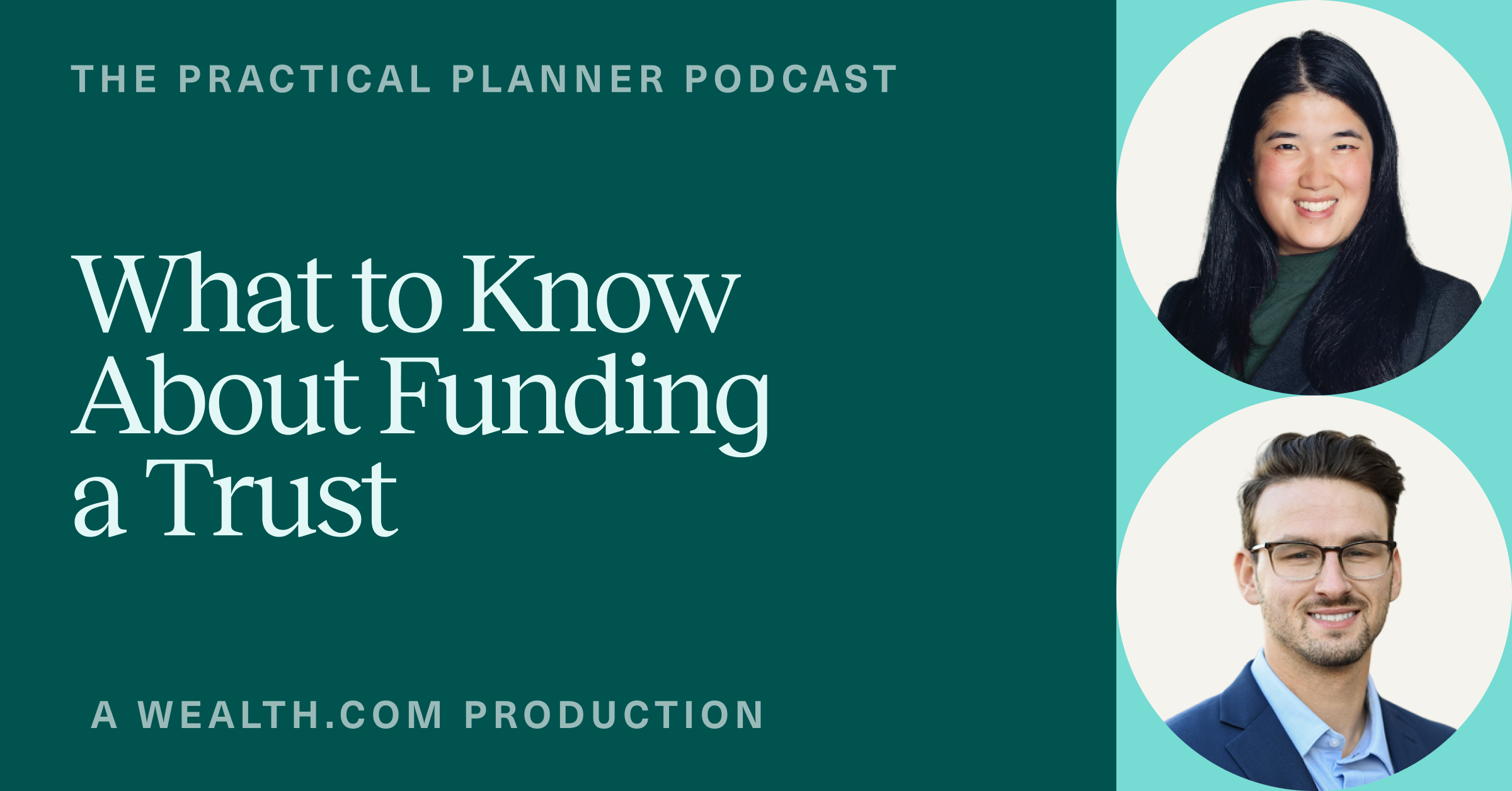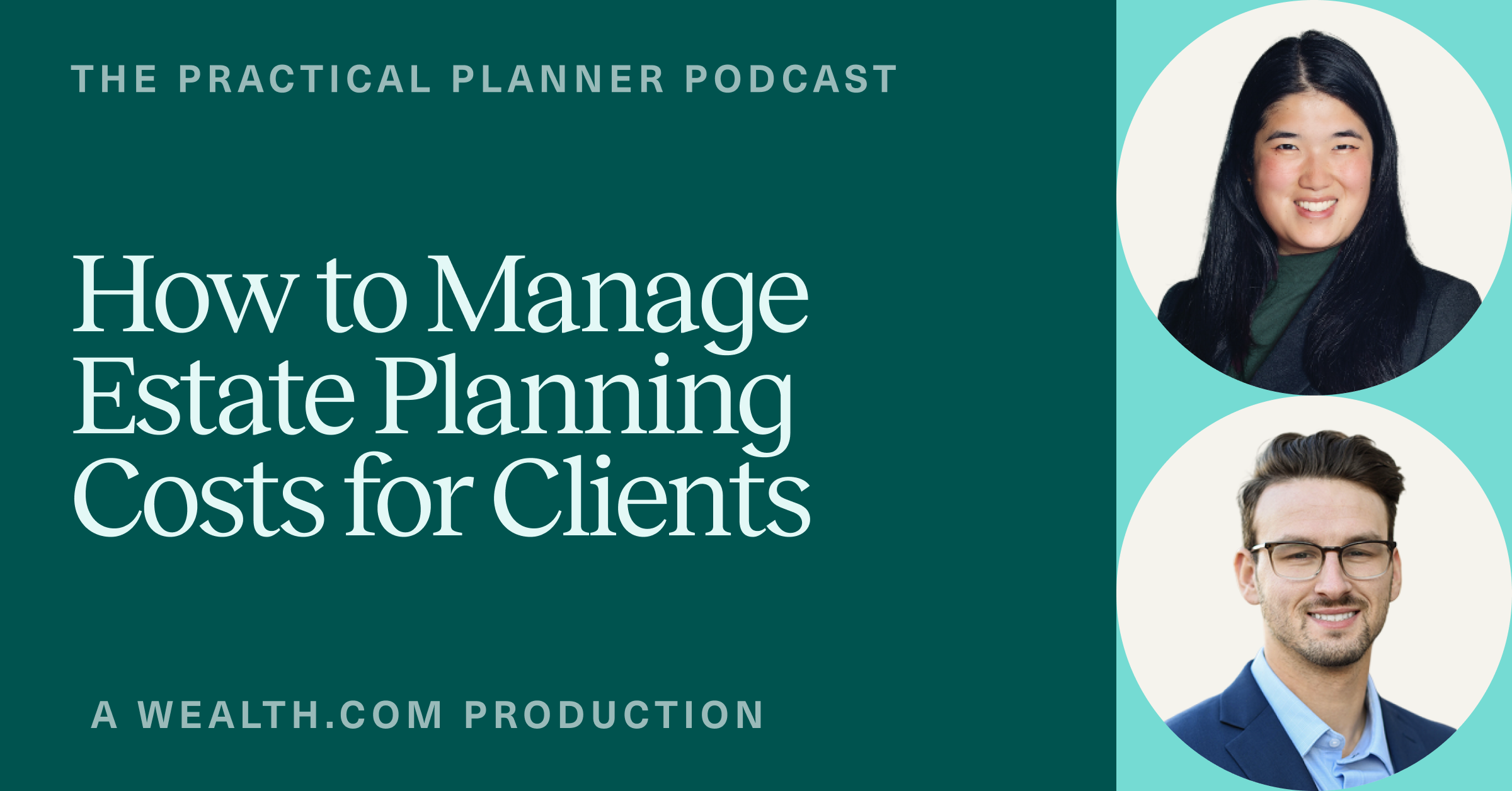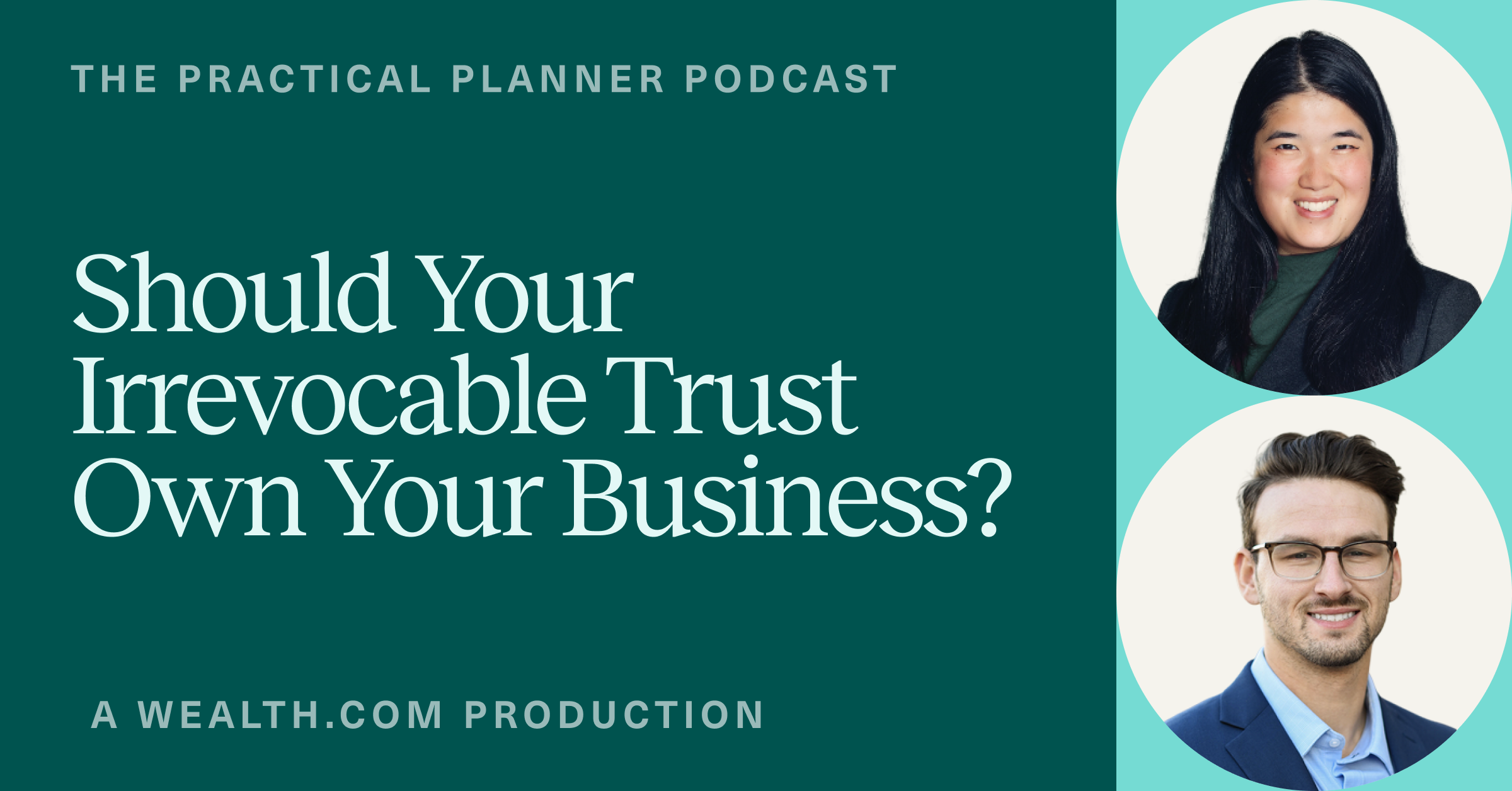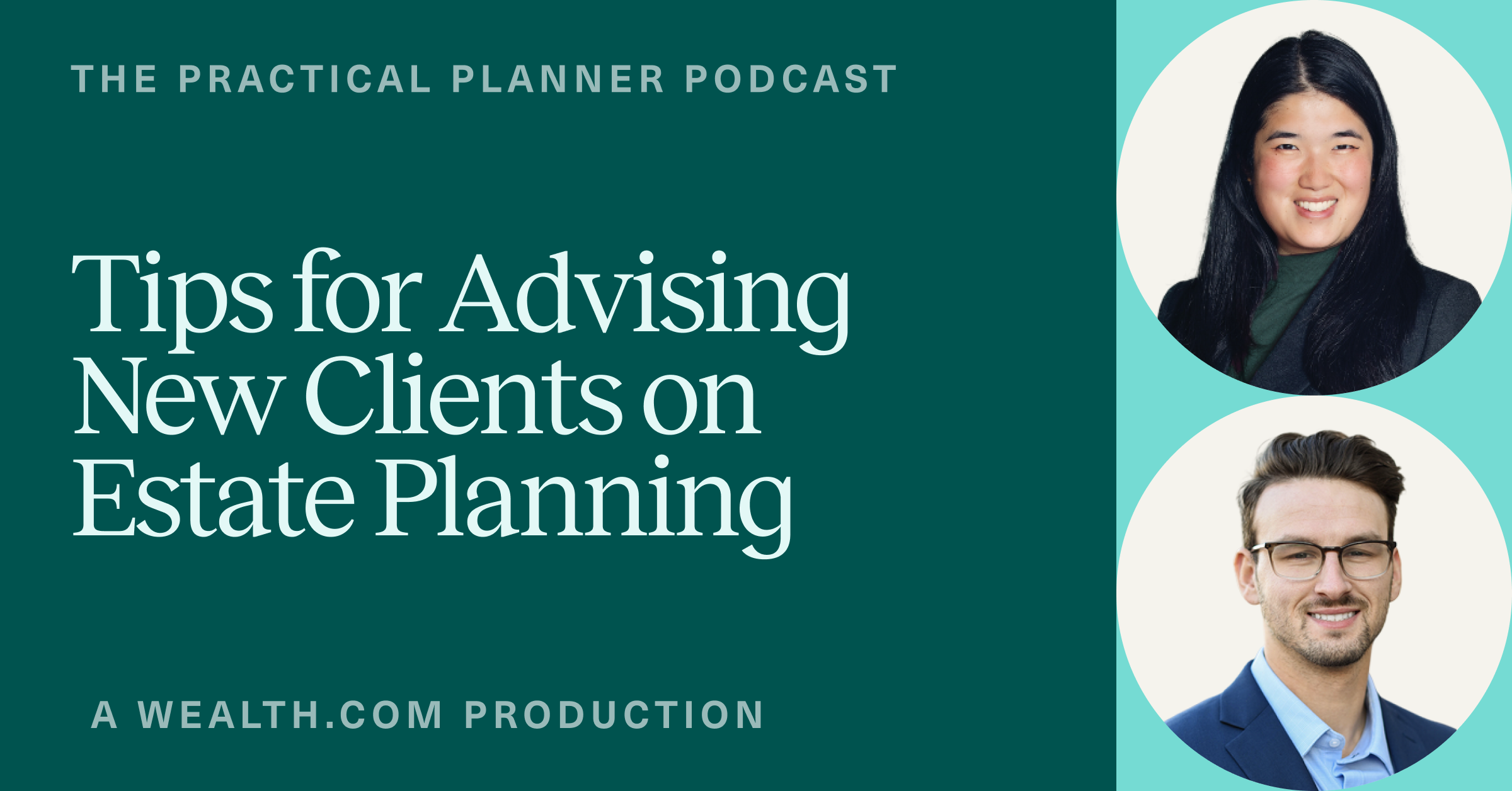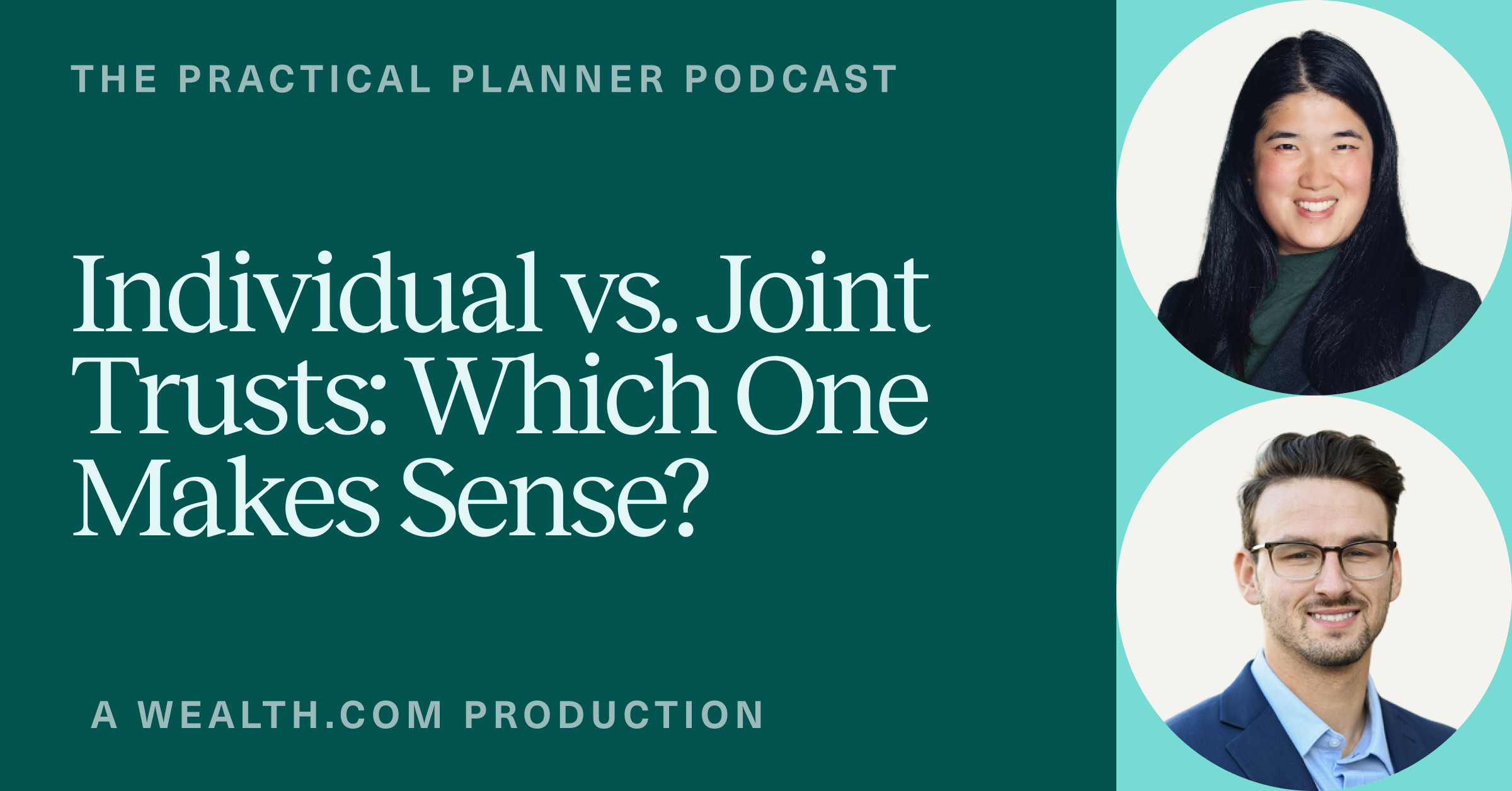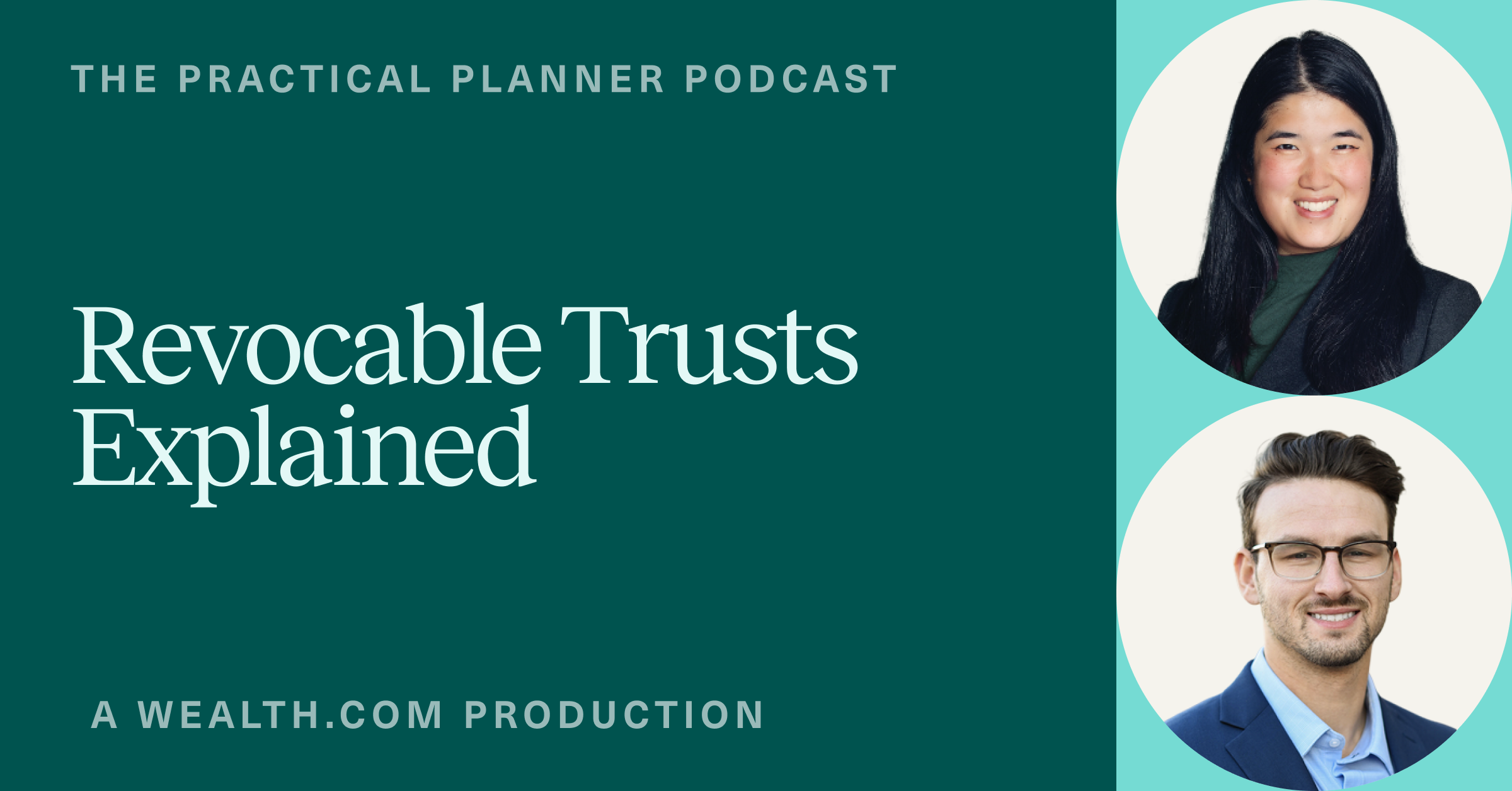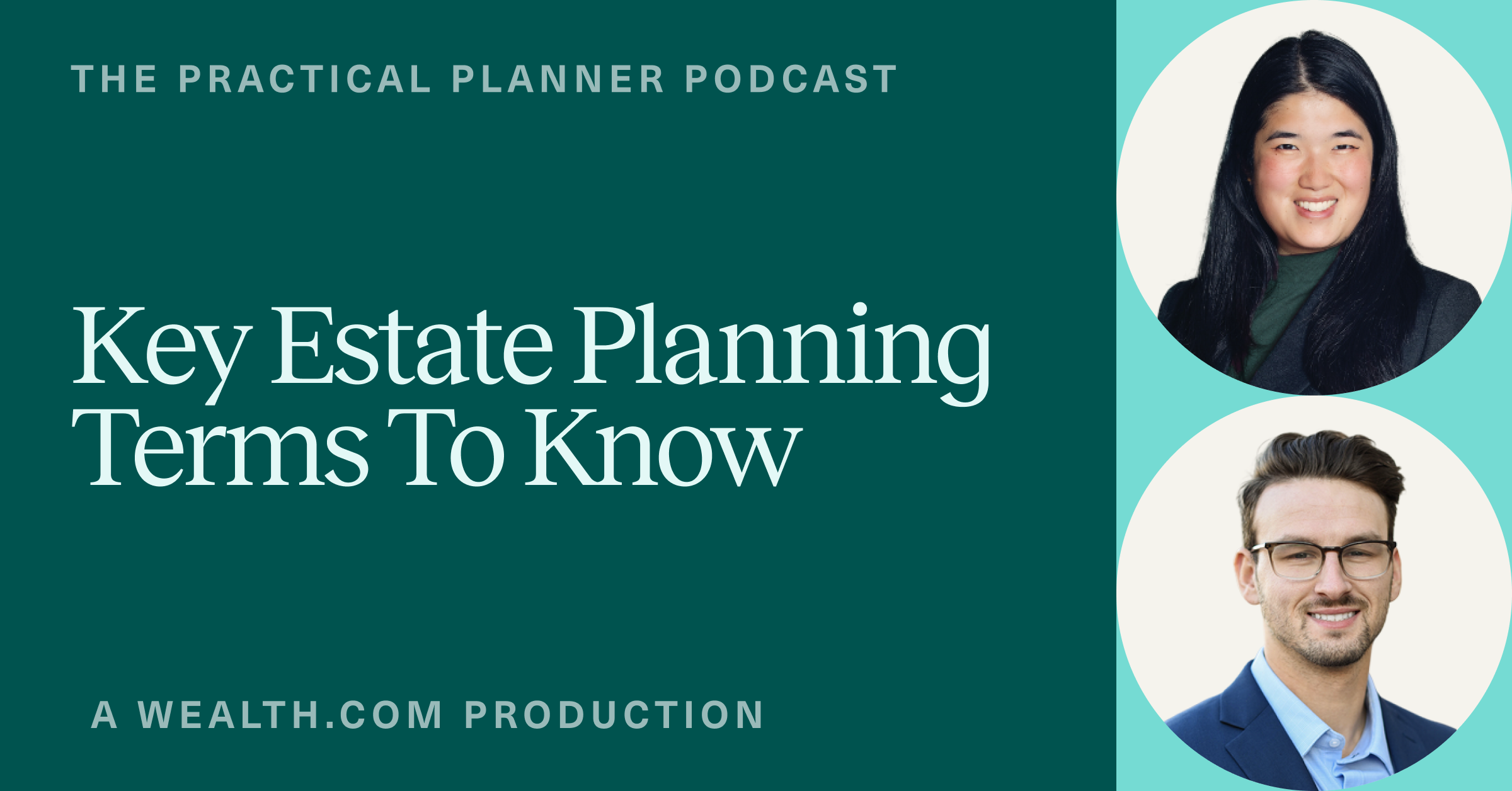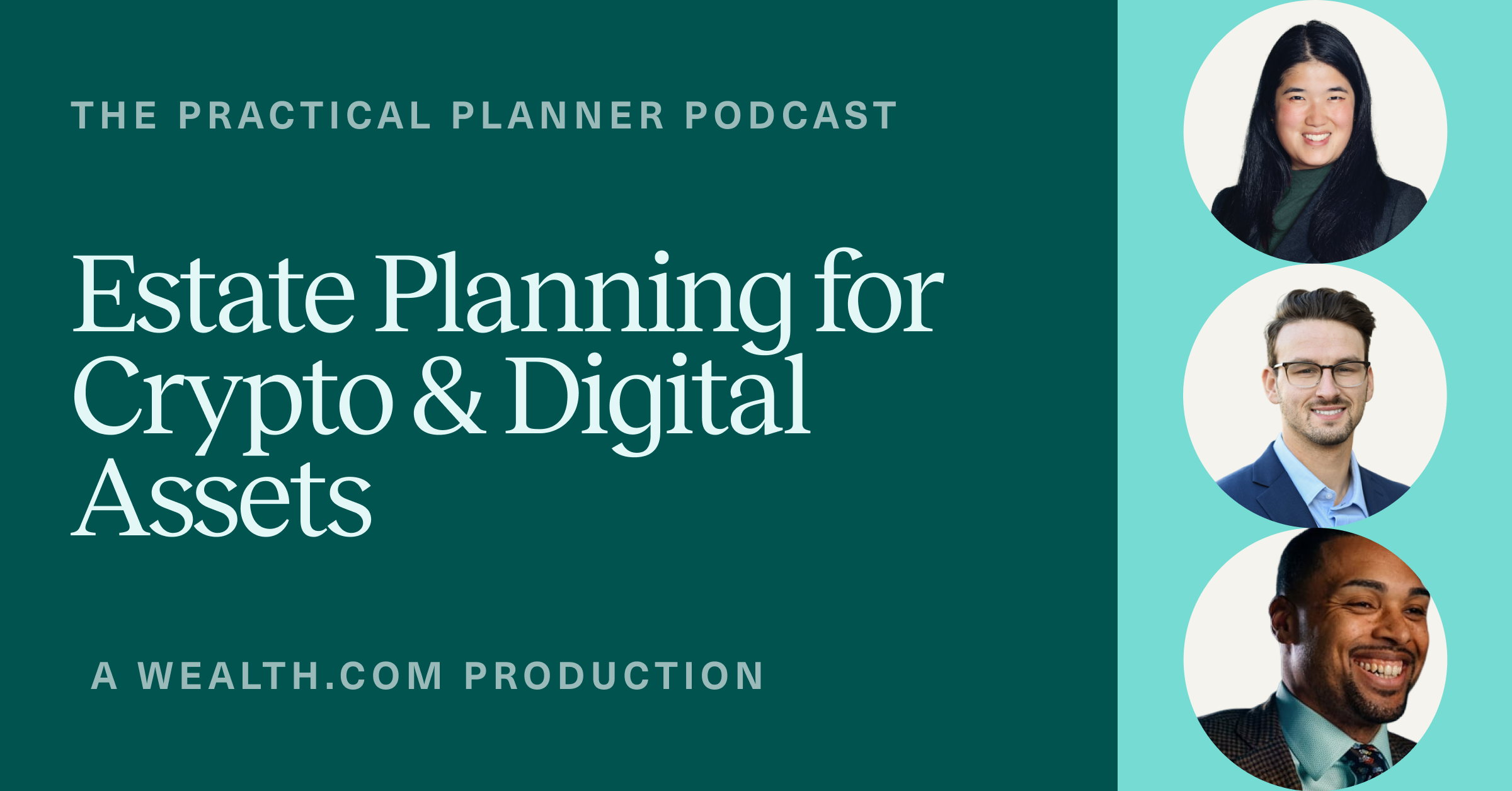Jennifer Rozelle, Owner and Attorney at Indiana Estate & Elder Law and host of the Legal Tea podcast, joins hosts Anne Rhodes and Thomas Kopelman to discuss what advisors need to know when helping their clients figure out what to do with their real estate assets. They touch on common mistakes to avoid, gifting strategies and why it’s often about helping clients have conversations they’ve been avoiding.
Full transcript below:
Thomas Kopelman: All right. Hello and welcome back to another episode of The Practical Planner podcast. I’m your co-host, Thomas Kopelman here with Anne Rhodes, my other co-host and then join with us is Jenny Rozelle. Jenny is just an awesome attorney in my neck of the woods, Indianapolis, Indiana.
Obviously you’re outside of Indianapolis, but nobody’s going to know the small towns anyways, so we’ll stick with that. And Jenny is also a part of Wealth.com as of, I don’t know, maybe was it like six months ago or so that you were one of the attorneys on the platform?
Jennifer Rozelle: Time is weird. We’ll go with it.
Thomas Kopelman: Yeah. Some time since they’ve been created, you got on the platform. But Jenny, we’re really excited to have you here talk all things real estate, everything from simple titling to complex transferring of assets between family members.
Jennifer Rozelle: Awesome. Well thank you guys for having me. And I have to tell you that I listened to your guys’ podcast, the last guest you had, Tyrone, and I hope that I can mimic his energy level so you guys can grade me towards the end.
Thomas Kopelman: That’s actually funny because Tyrone’s maybe the highest energy person, but you actually do match it. I don’t think there’s very many attorneys that we’re going to bring on that the energy is going to be that high, but that’s actually perfect back to back, now that I think about it.
Jennifer Rozelle: Setting the high bar, right.
Thomas Kopelman: Exactly. So I think real estate is obviously this really complex area, and I think what you wanted to do is really start with some of the more basic side of things and just even just go through documentation, titling, et cetera. So I’d love to hear from you how to get this right and some of the mistakes that you often see happen.
Jennifer Rozelle: Yeah. Where my head instantly goes when I think of real estate and estate planning is all the mess-ups I see, honestly. All the people that will pull deeds and things online and they try to do it themselves and they don’t understand how property ownership may affect someone’s estate plan. And it does. There’s just endless amounts of mistakes that are made all dependent on when you initially draft that deed or in some cases some people just hand write it. And unfortunately those have significant legal consequences, especially when people pass away. And really what transpires with that person’s ownership interest, depending on how they own the property and their interests as well as what type of estate plan that they have. So from a very high level, that’s where my brain instantly went was unfortunately the mistakes that I see and that I clean up all the time.
Thomas Kopelman: Yeah, I think one of the most common things I see from the Wall Street Journal to the regular market watch or whatever those articles are like, “What do we do? Parents passed away. Two of us don’t want the house, other sibling wants the house, they can’t pay for the house. They can’t buy us out of the house, they can’t maintain the mortgage. What do we do?” And so maybe it’s interesting to think through some of these conversations and is this really the parents’ issue? Should they have thought about this better ahead of time and clearly spelled out and helped mediate these conversations? And how do you do that?
Jennifer Rozelle: Yeah. Oh my goodness. Well, first the parents let’s call them Mr. and Mrs. Client, they actually have the ability to spell things out pretty specifically like that, whether it’s through things that are called specific bequests where they may want say their lake home or their cottage in Michigan or whatever to go to very specific people. So very much you can do that, though what I find mostly people will do is just leave it to the kids or the beneficiaries to “figure it out” later. And at that point, it’s really the executor or the trustee’s responsibility to weigh what the beneficiaries want and also take into account how much time do we want to give beneficiaries to line up financing or how much time do we want to give beneficiaries to figure out what they want to do. And so what I always tell beneficiaries in that situation is basically whatever they agree to, I can make happen.
But so often they get into one of my favorite things in the world is analysis paralysis where they get into just throwing out all these different ideas and sometimes don’t take any action and the executor or trustee, they’ve got to keep things moving forward. And so it really can get a little hairy pretty quickly. And so to answer your question, sure, the parents, whoever created the estate plan can put some pretty specific provisions. Most of the time at least I find they don’t. And then the beneficiaries are left deciding what they want to do and how much time they want to waste, I shouldn’t say waste, but how much time they want to spend working things out.
And I’ve seen it work both ways. I’ve seen it where beneficiaries absolutely will come to a consensus and come to an agreement. I’ve also seen beneficiaries start duking it out World War III style, unfortunately. So I’ve seen it all as I’m sure Anna’s seen it all too, but unfortunately at the end of the day, estate planning documents, they can do a lot. They can do pretty little as well, but when you start adding people and personalities into the mix, that’s when things get a little different.
Anne Rhodes: Yeah. I’m happy to jump in here and say a couple of things, horror stories or ways to plan around the horror stories as well, but the first thing I think that’s commonly misunderstood is you during your life or your client during their lives may really be enjoying this property and they think, “Oh, when I pass away, of course my children will all come back to the shore and remember the good old times and everybody will maintain this property and it’ll be great.” But actually this is where an attorney can be so, so helpful to give a reality check to the clients and say, “Do you really think this is going to happen? Is there a structure that we can put in place here so that it improves the chances that this will happen, that your dream for what happens upon your death will happen?”
Because the default, if you just leave a property to two or more beneficiaries is something called a tenancy in common. And that is a form of ownership where yes, there can be a specific percentage owned by the folks on the title, but actually every single one of them is on the hook for a hundred percent of the maintenance costs, the taxes, et cetera. And then each individual beneficiary can actually use a hundred percent of the property too. So it’s not like, oh, if I only own 50% of the property, I can only own half the house. That’s not how it works. So all of a sudden you’re already seeing anticipate, you have, let’s say one child who really loves that property, uses it all the time, but may not have the resources to actually maintain it. And now all of a sudden that causes jealousy with the other sibling where they’re like, “I never come to the home, or I come once a year and you go every weekend. So now all of a sudden I’m supposed to be on the hook for the taxes.”
And so that really creates a headache for the family. And you see beneficiaries really, like siblings, start fighting over whose usage and maintenance, who contributes to the property. So then with some of my higher net worth clients, when they have a dream of passing on the same property to multiple beneficiaries, we used to have a very real conversation with them about potentially forming a trust for that vacation home or whatever. But when you form a trust, which can be very detailed, as Jenny said, you can put anything in there, how they use it. You can really go into great lengths and you set up a trustee who’s going to be then managing that property. You have to also think about an endowment for your trust. And that’s where even the high net worth clients are like, “What is this endowment?”
It’s like, who’s going to pay? How is the trust going to generate money to pay for the income taxes, etc. So with our clients, we basically modeled this out and said, unless you have an endowment of, usually it was like half a million to a million dollars just to start it, then it’s not even worth doing that trust potentially because you still have the same maintenance issues. So those are some of the things that you start thinking about. And the last thing I’ll point out is sometimes you just give real estate to one beneficiary. So you may have a client who owns the home for one of their children, and we’ll talk a bit about intra-family loans as well to help that child get started, down payment, all of that stuff. But maybe that client owns a significant interest in that child’s property and it’s just one child.
So they say, “At my death, I want to just forgive the debt or just pass that property because it’s in my name right now, straight to that child.” So they just own it outright. The issue then becomes one, if there is debt on that property, what do you do? Do you also pass it free of debt or is it subject to the debt? So that comes to Thomas and Jenny saying, how do you service the debt? The second thing becomes, what about other beneficiaries? Because real estate tends to be a really significant chunk of that person’s net worth. Are you treating all the other kids equally? That can become a huge issue of equalizing gifts between kids. That gets tricky as well.
Thomas Kopelman: Yeah. I think the other issue I see is that even when you pass on an asset like this without a mortgage, there’s all of these quickly growing areas. I think about where my parents live right now. They live in Lake Geneva, Wisconsin, really nice lake, and it’s like there’s all these issues of all these people on lakefront properties that literally can’t even afford the property taxes anymore because just to have a spot on the lake is like $2 million. So parents maybe weren’t that wealthy, they just had this place for 70 years, it gets passed on and you’re sitting at 50, $60,000 a year of property taxes, and that’s just a whole issue in itself to maintain.
Jennifer Rozelle: Yeah, and one thing I thought of while you guys are both talking is I’m sure all three, well, I know I’ve heard it, I’m sure you guys have heard it too, that properties come in different shapes and sizes. And so here in Indiana land, I work with a ton of farmers. I have a ton of farm families, farm clients that I really have to counsel a lot of clients into when they call attorneys, counselors sometimes I really do feel like I’m a counselor because I will hear them say things like, “I want this to stay in the family forever and ever and ever and ever and ever and ever and ever.”
And I hear that a lot with farm families and what I see from my seat is, sure, it may go down the first generation, but when you start talking about generations after that, I consider that I’m not doing them a very good job if I don’t really advocate for some rip cord where beneficiaries are locked into this trust like Anne talked about, or any other mechanism whereby golly, they’re going to keep that property in the family until Lord knows what year. And it’s like that is very unrealistic. If someone came to the table and offered to them bazillions of dollars, you seriously would want them still to keep that and most of the time they will say yes.
And so to each their own right, to each their own. And there’s just so much counseling that goes on through these conversations from the legal end, from the financial end, from the tax, all the different perspectives. I just immediately when you guys were talking, I was thinking about my many, many farm families that, and I’ve heard it before with lake houses and houses down south in Florida, in Arizona, that they want it to stay in the family. And you just have to really weigh, I always say tee it up, talk about the pros, talk about the cons, and as long as my client knows what the pros are, what the cons are, I can say I’ve done a good job if they understand totally what that option’s pros and cons are, and from there, it’s their decision.
Thomas Kopelman: Yeah, I love that you brought this up because I think you would apply this to businesses too. I’m thinking about, I have a few friends who their parents own super, super successful businesses, and it’s like the two boys are anesthesiologists and pharmacists and the daughter’s a PT. Things are not looking good that anybody’s going to be taking over your business, but it’s been passed down from great grandpa to grandpa to dad. And I remember asking one of my buddies about this recently and he’s like, “Yeah, I have no idea. We haven’t really talked about it.” It’s like, “Yeah, your dad’s like 60-something, you guys are very wealthy. You might want to retire. You guys are going to take it over.” A lot of these estate planning things are just conversations that people put off and never want to have versus let’s have the hard conversation. But I know there’s a lot of kids, you don’t want to upset your parents, so you’re like, “Well, mom and dad die, farm’s gone. But right now we’re keeping the farm mom and dad, for sure.”
Jennifer Rozelle: Yeah, wink wink, yeah, keeping it. Yeah.
Anne Rhodes: On that note with the businesses, I have to say, it’s interesting because my father-in-law has one of these businesses that was grandfather to his dad and him now, and he’s looking at his kids, four sons and don’t think I want to settle. Two of them are lawyers, the older ones, the two younger ones, who knows. And so it took him a year and a half to two years to sell off his business in pieces because he came to the realization this was the end of the road for his family owning this business, which I think is very prescient-
Thomas Kopelman: Yeah, I respect that.
Anne Rhodes: And very self-aware. But then I’ve worked with clients and their families where for their businesses, they did keep them in trust and they set up whole structures, voting agreements or voting trusts so that the kid who runs the business keeps voting the stock the way that he feels like it. And his sisters I think just trusted him. They got the economic interest of the business, but they just trusted him to run his business accordingly. So you can do some really interesting estate planning structures for businesses, but you have to be really realistic about what it looks like.
Jennifer Rozelle: Yeah.
Thomas Kopelman: Totally. Okay, so let’s transition into some of the passing this on between family members and the way that I think about it is, and actually I’m working on a client right now who parents own a lake house. Parents are like, “Okay, this is going to you. Your siblings never use it. They don’t really want to”, but dad’s not in great health, mom’s not in bad health. And they’re like, “Well, we’re pretty close, almost 60, is planning to retire somewhat soon. We’d love to have this place”, but well, why would mom and dad, they could gift it to me now and use the exemption, but then now I have to take on and get a new mortgage so that doesn’t feel like a good idea.
The other one is like, well, what if we just wait until they pass away? But then it’s like, what if that’s 15 years? And their big thing is they don’t want to put money into a property that potentially isn’t theirs. Then when they pass away, their siblings fight about it and it doesn’t work out their way. So I think I’m just saying that to bring out, it doesn’t always feel like there’s a really good way to do this.
Jennifer Rozelle: Where my head was instantly going is my practice is split between estate planning and also elder law. And when I start hearing people talking about gifting my elder law brain just about explodes because there’s a lot of considerations there. We keep anchoring back to the same theme I think of there’s a lot of conversations that have to happen and with all sorts of property, whether it’s that someone wants to take a property like that, gift it, possibly use some of the exemption, maybe not, and let it pass through their estate plan, of course you get your potential step up in basis at that point.
From my elder law side of my brain, most of the time gifting doesn’t make a ton of sense because that could bite us in the rear at some point down the road. But that’s just one piece of a much larger puzzle. And so it really comes down to what is the parent’s goal, what are they trying to accomplish and what are the true realistic options when the kids get involved and what they’re able to do? Because last thing you want to do is get this house gifted to one of the kids and then the parents watch the kid not be able to afford it. And so just a lot of conversations have to happen in regards to these sort of things.
Thomas Kopelman: Maybe the best place to step back from this example and just talk and just educate people on what are even our options to think through in this side of things.
Anne Rhodes: Yeah. So I’m happy to jump in here because I had a lot of clients in New York and San Francisco who did a lot of interesting planning with real estate, particularly because it was quickly appreciating and they had some wealth to be able to play around with. And real estate has so many benefits under both the income tax and the estate tax side that it’s worth, I think, unpacking some of this. So the first things first I think is just helping a child when you’re thinking your client is wealthy enough to do a wealth transfer, how do I help my child grow their slice of the pie, the American dream? And so much of that I think for us is tied up in real estate in this country. And so how do I help them with the first down payment or potentially even just buying the property.
And so for my clients, the first thing, if it’s just a small chunk of that, let’s say the down payment, there’s a really cool article that just came out today, and this is April 1st, April Fool’s Day, in the Wall Street Journal but I encourage all of our listeners to read, and it’s about using intra-family loans to do some of this wealth transfer because it doesn’t use your gift tax exemption or your client’s gift tax exemption, so you’re not touching the $13.61 million. You don’t have to necessarily start doing even gift tax returns because what you do is a loan, but the line between a gift and a loan can be very thin when it’s intra-family, when it’s a mom or a dad helping their kids. And so some considerations, what happens is you make a transfer of let’s say $200,000 to your child to help with their down payment, but you structure it, you paper it, and the papering is very, very important.
You paper it like a loan, as though you were the bank for that child. You have to have a promissory note of some sort. That’s the debt instrument. You should have a mortgage. So that’s a deed titling thing that attaches on the deed, and you should have some sort of payment schedule that outlines at this percent interest we’re going to be paying on this schedule. So think is it amortized? Is it interest only with a balloon payment? You can structure that loan in different ways. There are certain ways that are more aggressive than others, and then it starts looking less like a loan and maybe more like a gift, but by and large, as long as you paper it like a loan as though you were the bank, that’s really good. You should talk to an estate planner at that point just to make sure you’re on the right side of the loan versus the bad side and giving a gift.
Then you can actually forgive interest payments or principal payments using your gift tax exclusion every year. So every year, every American is able to give $18,000 to any individual. And so that could be your child, and if you have a spouse now it’s $36,000. You just forget that on the debt. And that’s actually something that can also fast-forward the gifting of wealth transfer, although it’s papered like a loan. So that was a commonly employed technique that my clients did. You can be very creative. I had a client who was so smart, so one thing I didn’t mention is that interest rate. Why is it so good for you to loan versus a bank? The reason for that is because you can gift at a much reduced interest rate compared to what a private bank would give to your kid.
Let’s say right now the average interest is 7.5%. You can actually, you have to gift it at a certain level called the applicable federal rate. It’s just a rate that’s published by the IRS and depending on the length of the loan, it’s a slightly different rate. But let’s say it’s a long-term rate, it could be as low as 4.5% right now. So right there, you’ve given your child a gift of that 3% difference. And so anyways, all of that is to say that’s a really creative technique. Another technique… Oh, sorry.
Thomas Kopelman: I just want to add, I think there’s levels to this. I think there’s the maybe more middle-class family who it might be like, let me help you on the down payment. And if you think about the family that has two parents, three kids, you could give them quite a lot of money or you could even split it between a December and January payment where if you think about that, I mean $36,000 from the two parents per person gets you a long way. But then I think you’re talking about this next level of wealth of like, “Hey, we got to get money out of our name. Well, we couldn’t pay for the whole house without using a lot of our exemption, so let’s set it up in the loan this way.” And even on a $2 million property at 5%, even with that whole family structured in there, you do it right, you could basically forgive principal and interest every single year, but this is something that needs to be documented well.
I want to definitely go into how to do that because I’ve come across a lot of people who they are doing this with no documentation. Parents just gave us a mortgage and we’re just doing it at 3% and they’ll just follow market rates or whatever, or hey, parents do this, this, and this, and they didn’t even know. They just thought they were borrowing money from their parents and they didn’t even know about AFR rates. They didn’t know it would be a gift. If not, they’re just like, “Mom and dad helped us out and we’ll figure out how to pay them back when money comes our way.”
Anne Rhodes: Jenny’s face said it all.
Jennifer Rozelle: We like paper, we need paper, we need paper.
Thomas Kopelman: Well, is this like how the IRS gives you a three-year thing, if it is past three years, statute of limitations is passed. So in all likelihood it’s like what is the chance that you’re in that 0.1% that’s audited probably low, but you don’t want to be the chance that it is and then you’re just clawing back even though I guess it’d probably be you just lose some of that exemption, but still.
Anne Rhodes: Yeah. The issue with the IRS, that three-year rule that you’re talking about is there are ways to start the three-year clock because if you don’t even start the clock, then the IRS is like, “I’m free at any time to come and audit this transaction”, which is an issue. And then the way that you actually do start the clock is by filing a gift tax return, which we can talk about in a later episode. But the idea here is how would the IRS even know that this was happening? If the whole point is you structured it not as a gift, but as a loan, it shouldn’t even be on your gift tax return. It’s not a gift.
So that becomes a very interesting question, which is why when Jenny made that face, I wanted to make the same face because it’s like papering is so important because the first thing the IRS auditor will ask is, “Do you have paperwork to show this, that this is not a gift but a loan? Do you have payments to prove literally checks from your kid showing that they’ve been making these interest payments for X number of years?”
And I will tell you, I once for a client had to go back and try to figure out the paper trail, and I was sent all of these Venmo screenshots from the child for a few thousand dollars every month to mom and dad. And of course some of them are missing because the child forgot that month or it was Christmas and they were spending the money on something else, and that starts to really muddy the water. So you have to commit to this idea of the loan if you’re going to go that route.
Jennifer Rozelle: And you imagine the professional fees and doing this cleanup work. It’s the classic, you do it and you probably save yourself money in the long run versus you don’t do it necessarily the right way and you very well could be paying people like me significantly more money to do this cleanup work and the cleanup work may not indeed actually clean it up. We just cross our fingers and hope it does. And so it’s the classic, you just need to do it right from the get go. And I hate to be so old school about it, but at the end of the day, if there’s one thing I hear from most of my client, I want to say all of them, but is they don’t want Uncle Sam in the mix. They don’t want to pay more taxes. Well, if you don’t want to pay more taxes, then you need to be willing and able and ready to commit to doing things the right way as well. And this is to do things the right way, is documenting your way through this kind of transaction.
Thomas Kopelman: I think this applies to so many things though. I recently met with a prospect who DIY to holding company with three businesses, and I was like, they’re like, “We want to check the structure.” I’m like, “You need to go to an attorney. I could tell you that this is not right. How to fix it. I don’t know about that part”, but the amount of things that I see people try to DIY to save a few thousand dollars that is going to end up causing tens to hundred thousands of dollars in fees, taxes, penalties, et cetera, down the line is crazy what people think that they can do from Google.
Jennifer Rozelle: And a lot of times it’s not even malicious. A lot of the times it’s not like, “Oh, I’m not going to pay a darn lawyer to do that.” They just genuinely think, when I was at the very beginning of this episode when I was talking about people polling deeds and things online and go into the county office to fill out their blank little forms, it’s not like people are maliciously trying to cost themselves more of a hard time. They just don’t know. And unfortunately when you don’t explore your options, that’s just the way sometimes the cookie’s going to crumble. And I dare say if you start talking about real estate at all with the whole topic of this episode, when you start talking about real estate at all, it is never going to hurt you to get an attorney’s advice. Even if it feels so simple, it’s not going to hurt you.
Thomas Kopelman: Totally. Totally. Okay, cool. So we hit on inter-family loans, AFR rates. What are some other ways to maybe be passing on real estate and the good and the bad of those routes?
Anne Rhodes: I’ll mention a couple if I can jump in here. The second way that I’ve seen clients pass real estate specifically is a trust called a QPRT. And it’s a Q-P-R-T. And what that does is try to reduce the amount of gift tax exemption that you’re using on those transfers. And it’s specifically for property where you yourself or your client owns it and is trying to retain some usage right over that property. One of the things that can be confusing for clients when they’re doing these big transfers is in order to have made a successful transfer out of your own estate, so it’s no longer within your taxable estate for your client, is that you can’t keep using the property. You can’t retain the benefits of it. It has to go to your descendants. And so with a QPRT, what happens is you can chunk out the gifts to your descendants, but you want to retain for a certain number of years, perhaps the use over potentially the whole property.
And so what you do is you retain an interest within it, and that is calculated at an interest rate that is set by the government. So it is reflective of the current interest rate that you’re in, that environment, and we’ll talk a little bit about why that matters. But anyway, so you retain an interest in it and what remains after a number of years when that property has been sitting in that trust and that trust terminates, let’s say after five years, that remainder interest then passes to your descendants and you can take a property, chunk it up, do a five-year QPRT, or let’s say a three-year QPRT, five-year, seven-year, ten-year and give out little pieces progressively to your beneficiaries. It was very popular and it is very popular when interest rates are really high. So this was a technique that we didn’t really see for a little while until more recently when interest rates have increased and all of a sudden right now QPRTs have resurged in popularity as a result.
Thomas Kopelman: What’s the discount part of it? I always see people talking about there’s a discount component. I’ve seen posts recently that through using them, you can get pass on real estate at a 45% discount now. I think I just saw a thread about that last week.
Anne Rhodes: So the idea is that that’s the value that you’ve retained. You’ve retained the use for five years, that’s calculated at that interest rate. And so when you calculate the difference between the remainder interest and your retained interest, that’s where you got the discount. Because let’s say you passed property, a property chunk like a value of 100K and the remainder interest was valued at 55% of the total and your retained interest was the 45%, that’s where you’re seeing that discount because you passed full value of 100K, but you didn’t claim a tax exemption usage of 100K.
Thomas Kopelman: Usage mean living in it pretty much, or how does it really enforce? Because if that was my parents and I’m like, “I can bring guests, whoever and whenever I want”, what is there to say I can’t invite my parents to come up for 18 weekends a year?
Anne Rhodes: Right. So exactly. So actually as long as the parents still has that retained value, they can actually use the whole thing. Remember we talked about tenancy in common, how X percent, you may own only X percent, but actually you retain the use over a hundred percent. So that follows this retained use. So you own only X percent because that’s your retained use, but actually the entire property is available to your parents to continue using if they’re the ones doing the QPRT, if that makes sense. So it’s a really nice way to slowly have the parents let go, take the value of the property out of their taxable estate so that when they pass away, it’s completely out of their hands and doesn’t inflate their own taxable estate, but also not use the tax exemption over the whole value of the property. So again, in that example, let’s say it was 100K house, instead of filing a gift tax returns that uses 100K of my tax exemption, instead you’ve just claimed 55% of that, like a 55K gift and you retain 45K.
Thomas Kopelman: Is this more of a strategy for people over the taxable estate? If you were like, hey, we have $2 million net worth, is this even something that you would… My mind goes, you might as well just gift it to somebody if you’re never going to have a worry about estate tax issue.
Anne Rhodes: This is for somebody who for sure is hoping to squeeze every dollar of tax exemption that they can out of that transaction. So they don’t want to just do a one-to-one transfer of their tax exemption to that heir. So they want to, instead of having a $13.61 million exemption, they actually want to inflate it to potentially like $20 million, $25 million.
Thomas Kopelman: Okay, that makes sense. That’s a good strategy. Jenny, what about just gifting in general? Let’s say, I’d love to go through the, okay, if parents are going to give real estate to one child, for example, let’s say they keep it simple, what is the upside and the downside of doing that while still alive versus waiting till after they pass away?
Jennifer Rozelle: Yeah, actually that question and your last question go hand in hand because what I was thinking, if you have someone that’s more maybe middle class, average net worth, not high net worth that maybe they do want to consider gifting for whatever reason. I mean, the reason they’re gifting sometimes doesn’t matter to us. They may have just their own motive or reason to gift something to someone else. A strategy maybe that they could potentially explore is maybe gifting as well as retaining what’s called a life estate interest, which basically also gives them the ability to remain in the house. They still have the rights to continue to enjoy it. So it’s maybe a more average net worth ability to do exactly what Anne was just describing. But for whatever reason, they’re wanting to gift the property out of their names, they could do that for whatever reason and maintain a life estate interest.
And the reason that I mentioned right before we started recording, I work with not a ton of people that are super high net worth. And so that’s why I actually asked Anne to speak more into this. And so I come more from a place of those are my people that the people I often help, Thomas, or those people that most of the time transparently, they’re not looking to gift. They’re really not too close, or I shouldn’t even say too close. They’re not close at all to any sort of estate tax threshold. The only time I ever hear people, my kind of clients talking about gifting is when they’re trying to gift out of their names for, say, protecting it from “the nursing home” and things like that. So from my side of the table, I don’t deal with a ton of gifting unless there’s some very specific reason to do it like they’re trying to help their kid get off the ground or something like that.
Thomas Kopelman: Well, I think about just the thought of, okay, what if parents, maybe they have a second little lake house or something, and for them it’s like we don’t really have the ability to go use and enjoy it, and we don’t really want to maintain the property and the cost, et cetera. So it might actually just make sense for us to give this now.
Jennifer Rozelle: A lot of my clients still don’t do that. They will wait until they passed away and they’ll set their estate plan up to absorb something like that. And I do do a lot of estate plans that, like Anne was referring to earlier, that may build in a little trust to house that property. And what I usually encourage them to do is to plop some money into that trust as well to take care of the expenses, the maintenance, the debt, all the things. And still you can tell this must be what’s at top of my mind, still give those beneficiaries a ripcord. And so most of the time my clients aren’t really gifting too much. They’ll put those specific provisions in their estate plan to say, leave the lake house to the kids or leave the farm to the kids, or whatever. And we’ll just strategize different ways to try to accomplish what they’re attempting to accomplish and really set the kids up or the beneficiaries up for success as well. And usually that means plopping some money inside that trust as well.
Thomas Kopelman: Okay, that makes sense. Anne, what about you? Do you think there’s any downsides to gifting while still alive that you guys can think of?
Anne Rhodes: I mean, it’s that you lose the access to the property because the idea of gifting is you can’t… If the whole point is to get that thing out of your taxable estate, you have to be willing to let go of the use. Who gets to decide what happens to the property, including maybe selling it at some point? You have to put that in the hands of others.
Thomas Kopelman: But no step up and cause spacious issues or anything like that.
Anne Rhodes: The one thing I will mention also is I did have clients in this ultra-high net worth space who they’re like real property landlords. They have extensive real estate portfolios, and there the major downside is cash flow loss because the idea is this is how they generated their income. They lived a really nice lifestyle, now they’re starting to gift away the real property. You have to gift away the benefits, the economic benefits, which is not just use, but the income that generates as well. So you have to really use a financial advisor’s help to model out what that income is. What is the income per real property asset, perhaps even like they’re put in an LLC. What’s the income that you were expecting and living off of from that LLC and what does that mean to your cash flows?
The other thing you worry about with real estate, I’ll just point out in case you have a client like this, is that real estate is not very liquid and you don’t want to be forced to fire sale it upon death. And so one thing that ended up impacting a lot of our clients who had extensive real estate portfolio is if they have a taxable estate, if they have huge tax bills, how are you going to generate liquidity to pay for those things? And sometimes it’s actually as a financial advisor worth it to talk to that client about having a life insurance wrapper or life insurance proceeds to generate liquidity so that the beneficiaries are not stuck with an enormous tax bill that they have to generate cash for by selling property at a fire sale.
Thomas Kopelman: This is one of the best permanent life insurance uses. I am not the biggest proponent until you get to that high net worth space. And then there are some good uses just like liquidity in paying estate tax. I think that’s a really good one to add.
Jennifer Rozelle: Can I add two super quick things?
Thomas Kopelman: Yeah.
Jennifer Rozelle: Okay. So one is a fun little nugget. So on my podcast, I recently did a podcast episode on Joe Robby, the founder of Miami Dolphins. And that’s exactly what he had to do, Anne, where when he passed away, his entire estate value pretty much was in the stadium that he built and his team, the Miami Dolphins. And so long story short, they had to sell both of them to pay for all the administrative expenses, including estate taxes. So there’s a fun little nugget. The second thing, which is I guess I’m on the theme of fun little nuggets, I tell clients when we start talking about gifting, I’ve totally made up a word that I need to trademark or something because I call it a gift is untake-a-backable.
Once you gift it, you can’t take it back. It’s untake-a-backable. I know that’s not a word, but it’s a funny word and it usually makes people laugh, but I’ve had clients where they will gift interest or shares of a farm or a business and something has happened and they’re like, “Hey, I want that back now.” And it’s like I’ve seen where the kids are like, “Sorry, dad, not giving it back.” So gifts are untake-a-backable. Just to add on to what Anne mentioned, that you just got to be okay with this, it’s gone.
Thomas Kopelman: I think that’s the perfect way to think about financial planning, estate planning, et cetera, is I think you can really lead with what’s the best way to minimize taxes? Do this, but it might not be the best thing for somebody’s life. And I’m thinking of an example of somebody that I worked with that they were super wealthy for a second. It was like they sold business, it was worth $30 million. They were 40 years old, but 75% of it rolled into a new company. That company went from $10 a share to 70 cents a share. And luckily, they weren’t people who ended up using your evocable trust moving a lot of this stuff out of their name because if they did, I mean this person went from $25 million net worth to three in a year. Maybe that’s going to bounce back. Maybe it’s going to be great or maybe their $3 million net worth and it would’ve been really unfortunate to have half of that into some irrevocable trust because in that year it was the best idea ’cause they were so wealthy at 40 years old.
Anne Rhodes: And you also have to have a real conversation with your clients about what their future to be. I’ve had so many clients who made the money, were like, “I’m ready for my next startup”, or whatever. And then it turns out they just wanted to retire. Five years later, they come to you after doing all this gifting, and then they’re like, “Actually, I don’t want to work anymore.” And then you’re like, “How are you going to generate that income?” And so we always had a saying, which is like, “Do not let the tax tail wag the lifestyle dog”, because you need to live your life and then worry about the taxes. Worrying about taxes is a good thing, but-
Thomas Kopelman: This is so important, I guess, financial advisors and estate planning attorneys to hear this and think it, because right now we have a client we’re working on that’s very, very wealthy. He should be able to sell his business the next few years for, they don’t know, anywhere from $100 to $200 million. He owns 90% of it. He doesn’t want to give it to anybody. He’s like, “I’ve helped my kids. Over the next five to 10 years they’re still a little younger. We can fund life insurance for the couple million I would give everybody, but we’re going to spend every dollar we have left.”
And we keep meeting with some estate plan attorneys and we’re like, “Hey, listen, they care about charity and spending this money.” And they’re like, “Here’s you should do your evocable trust for this, this, and this.” And he’s like, “Can we go interview a different attorney because they’re obviously not listening to me.” And I think sometimes people forget as professionals in our jobs, it’s not to give you the best tax planning strategy, it’s to give you the best strategy that funds your life that ultimately next is tax efficient. It’s that before that, not the flip side. And I think a lot of people get really caught up being there.
Jennifer Rozelle: You need to drop the fictitious mic. There you go.
Thomas Kopelman: Well, cool. Is there anything else that we need to hit on in this topic as it relates to real estate?
Jennifer Rozelle: Do we dare go down the timeshare rabbit hole? I don’t know if we want to or not.
Anne Rhodes: Maybe another day. We will have you back, Jenny, so that we can talk about those timeshares. I think all of us love.
Jennifer Rozelle: Yes. I’m fine with not going down that rabbit hole. I’m totally fine with it.
Thomas Kopelman: Well, perfect. Well, Jenny, we really appreciate you coming on and sharing all the info with us. I think you’ll be a repeat guest for us between my podcast and this podcast. But we really appreciate your time and everybody thank you again for listening. If you want people like Jenny to keep coming back, let us know. Send us your questions. But please leave a review, subscribe, and we’ll see you back for the next episode.
